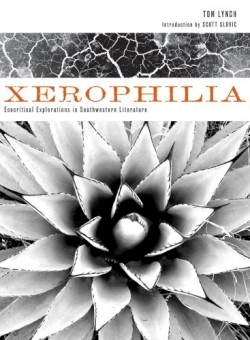Xerophilia
Ecocritical Explorations in Southwestern Literature
“Xerophilia” is not an unnatural affection for copy machines. Bioregionalist ecocritic Tom Lynch uses the word to indicate an embrace of deserts—their biotic elements and their inhabitants. Under discussion here are those located in the American Southwest and the Mexican border states of Sonora and Chihuahua. Lynch plumbs a sampling of fiction and nonfiction, inviting inhabitants of verdant places to see the exotic differences of arid lands rather than thinking in simplistic terms of culturally-tinted deficits. Deserts of the Southwest are far from empty voids; they’re places of incredible biodiversity where open-minded visitors have every reason to feel vivacious, close to the earth, and aware.
This book is divided into four broad ruminations, leading off with social justice in the acequia irrigation systems of New Mexico. This community-based method of ditch farming integrates long, narrow property lots of multiple families into a single gravity flow. The chapter sharply defines the current battle’s positions: residential rights versus market-based commodification of land and resources. Other chapters examine crime and futuristic fusion in the borderlands, and deserts as interpreted by the five senses. A section on ants and other invertebrates doesn’t equal the rest in enlightening insight.
Writers covered include the sensual Terry Tempest Williams, who sees femininity in arid places; the formerly incarcerated Ken Lambertson who finds an overwhelming sense of freedom; and the crusty park ranger persona of Edward Abbey, exhorting tourists to leave the antiseptic safety of their cars. Supremely praised is the novelist John Nichols, best known for the culture clash laid out in The Milagro Beanfield War. The list of respected, incisive fiction writers and naturalists with expertise on the region who were left out is extensive enough to suggest that Lynch has ground yet to cover.
The primary opponents on many issues in the American Southwest over the last forty years have been working class / subsistence Latino farmers and middle class Anglo environmentalists. Lynch calls for a unification of purpose between the interest groups, with an eye to rampant strip-mallization and over-development as the truly insidious forces. Lynch, the partisan observer, identifies with the invaded rather than invaders, aboriginals over frontierists. He contends that Spanish traditions featuring deep background influences of Arabic desert peoples more naturally fit the peculiarities of arid lands than that an idea-set developed for the English countryside and it’s New Englander succession of settlers who are predisposed to favor plentiful grass, trees, and drinkable water.
Disclosure: This article is not an endorsement, but a review. The publisher of this book provided free copies of the book to have their book reviewed by a professional reviewer. No fee was paid by the publisher for this review. Foreword Reviews only recommends books that we love. Foreword Magazine, Inc. is disclosing this in accordance with the Federal Trade Commission’s 16 CFR, Part 255.

